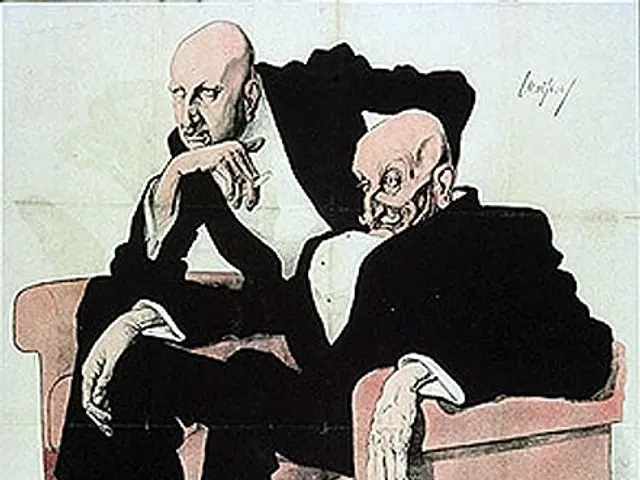A New Era for the Weimar Triangle: Macron, Tusk, and Merz Seal Franco-Polish Alliance
Macron and Tusk formalize the French-Polish bilateral agreement - French President Emmanuel Macron and former European Council President Donald Tusk ink a friendship accord between France and Poland.
In the historic city of Nancy, a land steeped in ties between Lorraine and Poland, a revolutionary event took place on May 9, 2025. The Franco-Polish Friendship Treaty was signed between Polish Prime Minister Donald Tusk and French President Emmanuel Macron, marking a significant milestone in Franco-Polish relations and European cooperation.
This treaty, deemed "groundbreaking," encompasses mutual security guarantees and signifies a profound escalation in bilateral ties. Tusk, who signed the treaty alongside Macron, underscored its importance as a crucial step in Franco-Polish relations and European unity [1].
Newly appointed German Chancellor Friedrich Merz, who assumed the role in early May 2025, has prioritized strengthening ties with both France and Poland, indicative of a "restart" in Franco-German relations and a renewed emphasis on the Weimar Triangle as a trilateral cooperation mechanism [2][3]. Merz's first overseas visits to Paris and Warsaw exemplify a shift towards a more resilient EU, with a focus on defense collaboration, economic integration, and building a stronger European identity.
In Paris, Merz and Macron pledged to strengthen their cooperation across various sectors, including defense, energy (particularly nuclear and renewables), and EU competitiveness [3]. Furthermore, Merz underscored Poland's importance as a valuable partner in the Weimar Triangle, aiming to revitalize and fortify this trilateral alliance [2][3]. The devised agenda includes the synchronization of investment policies, security frameworks, energy policies, and space cooperation, with the ultimate goal of advancing European integration and resilience [3].
Germany's new Foreign Minister, Johann Wadephul, selected France and Poland for his inaugural official visits in May 2025. His itinerary underscored the indispensable role of the Franco-German partnership and the Weimar Triangle in maintaining European stability and unity in the face of global challenges such as the conflict in Ukraine [5]. The continued emphasis on trilateral cooperation aims to reinforce Europe's security architecture and foster an harmonious alliance between Western and Eastern EU members [5].
The recently signed Franco-Polish treaty lays the foundation for mutual defense and serves as a cornerstone within the Weimar Triangle context [1]. Germany intends to leverage the Weimar Triangle not just as a symbolic entity but as a dynamic platform for forging "coalitions of the willing" to address Europe's most pressing challenges, including defense, economic cohesion, and energy transformation [2][3].
France and Germany plan to collaborate more closely on low-carbon energy technologies, investment policies, and regulation to bolster their competitive position within Europe [3]. Continued trilateral engagement is expected to serve as a bridge between Eastern and Western Europe, enhancing the EU’s ability to cohesively respond to an uncertain geopolitical landscape [5].
In essence, the Franco-Polish Friendship Treaty marks a turning point in the Weimar Triangle partnership, with a primary focus on mutual defense and heightened cooperation. Germany, under Chancellor Merz and Foreign Minister Wadephul, seeks to revitalize and strengthen this trilateral framework, aiming to forge a strategic renaissance of European unity through robust bilateral and trilateral relations, economic integration, and coordinated defense efforts. The Weimar Triangle is poised to transition not only as a historical emblem but as a dynamic force, playing a pivotal role in addressing current and future European challenges [1][2][3][5].
- The signed Franco-Polish Friendship Treaty in Nancy, France, on May 9, 2025, serves as a crucial foundation for mutual defense within the Weimar Triangle context.
- Germany, under Chancellor Friedrich Merz, has prioritized cooperation with France and Poland, aiming to revitalize the Weimar Triangle, a trilateral cooperation mechanism.
- The Franco-German partnership, as well as the Weimar Triangle, is deemed essential for maintaining European stability and unity, particularly in the face of global challenges such as the conflict in Ukraine.
- TheWeimar Triangle is expected to transition from a historical emblem to a dynamic force, forging "coalitions of the willing" to address Europe's most pressing challenges, including defense, economic cohesion, and energy transformation.
- Germany's new Foreign Minister, Johann Wadephul, has underscored the importance of the Franco-German partnership and the Weimar Triangle by selecting France and Poland for his inaugural official visits, emphasizing the need for continued trilateral engagement.






